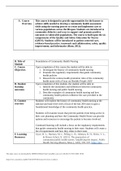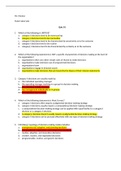Arizona Western college
Latest uploads at Arizona Western college. Looking for notes at Arizona Western college? We have lots of notes, study guides and study notes available for your school.
-
125
- 0
-
5
All courses for Arizona Western college
- Brian Sanders Pharmacology Clinical Reasoning 2021 | RN 101 Infection/Inflammation or Sepsis Case Study - COMPLETE RN101 1
- Brian Sanders Pharmacology Clinical Reasoning 2021 | RN 101 Perforated Bowel or Sepsis Case Study - COMPLETE RN101 1
- Brian Sanders Pharmacology Clinical Reasoning 2021 | RN 101 Small Bowel Obstruction - COMPLETE RN101 1
Latest notes & summaries Arizona Western college
Chapter nine outline - Introduction to Sociology
Introduction to Sociology - Chapter seven outline
Chapter outline for Intro to Sociology
Chapter four outline, summary
Summary of chapter three, PowerPoint
Chapter outline for textbook SOCIOLOGY 12th ed. Shephard(2018) Course: Introduction to Sociology
NRNP-6531-14-Prim Care Adults across Lifespan – Quiz - Week 5 Knowledge Check
A. Course Overview This course is designed to provide opportunities for the learner to achieve skills needed to develop a community health assessment while using the nursing process to create and implement care to various populations across the lifespan. Students are introduced to community didactics and ways to support and promote positive outcomes to vulnerable populations. The course is built upon the six competencies of the Quality and Safety Education for Nurses (QSEN). Students wi...
5e-lesson-plan-elementary-science-methods (1).pdf
Which of the following is UNTRUE? a. category II decisions tend to be nonrecurring b. category I decisions tend to be nonroutine c. category II decisions tend to be characterized by uncertainty as to the outcome d. category I decisions tend to be routine e. category[ I decisions tend to be characterized by certainty as to the outcome 2. Which of the following statements is NOT a specific characteristic of decision making at the level of the organization? a. organizations often use rather...










